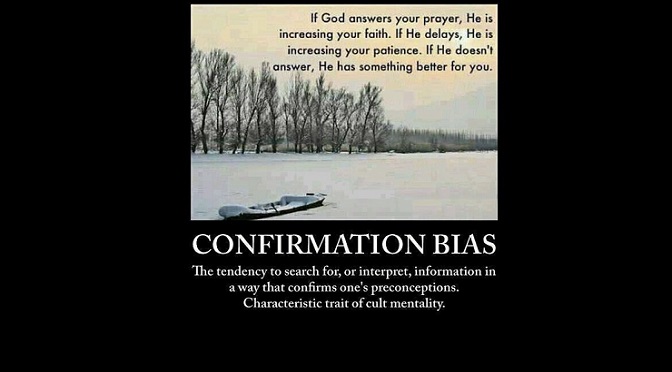Confirmation Bias – When everything that happens is interpreted to reinforce your existing beliefs; that is the human tendency to promote information that supports what we already believe, and dismiss information that devalues our position.
For example: You pray for god to keep your family safe, but they get sick or injured anyway. So you pray for god to heal them. When they don’t get better and have to go to the hospital, you pray for god to help them recover. When they get worse and go into intensive care, you pray for god to heal them.
However, after 3 operations, and 5 weeks in intensive care in a state-of-the-art hospital they get better, but instead of thanking the doctors and giving credit to modern medicine for their recovery, you thank God. ”Look how God was watching over us the whole time!”
However, if they worsen and die, well then you say “What did I do wrong!?”, or “I must be a bad person, God is punishing me!” or “It’s God’s will and only God knows what’s in God’s plan.” “God works in mysterious ways. He knows what is best for us in the long run.”
No matter what happens, your mental image of God comes out smelling like a rose, so you praise God again. No matter what happens, its God’s will and, therefore, for our own good. No matter how bad it is. This is an example of Confirmation bias.
“Confirmation bias (also called confirmatory bias or myside bias) is the tendency of people to favor information that confirms their beliefs or hypotheses. Put another way, you give more weight to evidence that supports your preconceived beliefs and you give less weight (or ignore) evidence that contradicts your beliefs.
People display this bias when they gather or remember information selectively, or when they interpret it in a biased way. The effect is stronger for emotionally charged issues and for deeply entrenched beliefs. People also tend to interpret ambiguous evidence as supporting their existing position.” – Wikipedia
When you pray, what exactly are you expecting God to do? Why bother if whatever happens is in God’s plan? And why are you praising Him when He fails you?
Atheists and rationalists don’t believe in god, and therefore are able to deal with reality on its own basis; evaluating all evidence on its own merit. If family member gets sick or injured, we deal with it using real world solutions. In hospital settings, where patients are being prayed for, we generally see equal results with those who are not being prayed for, but then we don’t have all that excess mental/spiritual baggage interfering with our thought processes as we strive to support our loved ones and cope with that emotional rollercoaster. Instead of wasting time on our knees, we’re doing whatever is necessary to plan, research and implement whatever real-world solutions might be available to us to actually improve the chances for their full recovery.
And if the worst case should happen, we don’t have to wring our hands in worry that we might have fallen out of favor with some supernatural being. What happened just happened, it’s nobody’s fault for not going to church, or not being a “good” enough Christian, or not praying the right prayer. It’s a purely natural consequence of living in a world that is full of dangers; both biological and physical.
The media has gotten very good at homing-in on certain groups to exploit this tendency toward confirmation bias. Fox “news” caters to those who have a confirmation bias toward conservative biases; MSNBC caters to those with liberal ones. Hardly any news outlets just present the news anymore. The one that comes closest today seems to be Al Jazeera, and it’s our shame that it’s not one of our own American news outlets.
Even the internet is not a neutral source of information. Google and Facebook, among others, are routinely sifting through your searches and posts to see what your personal biases are, and then they chiefly supply you with links and search results that align with them. More and more you exist in a bubble of belief that is protected on all sides by barriers that you have set up yourself, either intentionally or not.
Evidence speaks for itself. It’s up to us to properly search for and evaluate it; and to adjust our world-view appropriately. Ignoring or suppressing evidence only leads us to making the wrong decisions; and those decisions could be life-critical, not only for ourselves, but for those who depend upon us.

